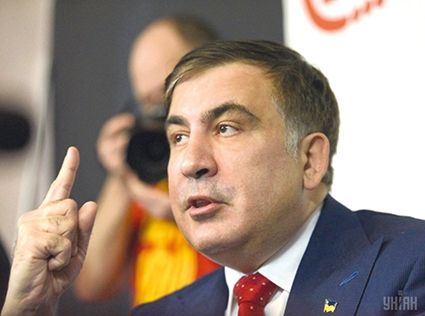On Saakashvili’s Return
Op-ed
The newly-elected President of Ukraine has kept his word and returned the citizenship of Ukraine to the third president of Georgia. Mikheil Saakashvili is back to Kiev with new political plans and has already announced the beginning of the new stage of his fight against Ukrainian oligarchs. What matters now is where he begins: in the Ukrainian government, parliament or the street; though at the moment he is talking more about the perspectives of Georgian politics than Ukrainian, which makes his future plans even more ambiguous.
“By traveling to Kiev, I am much closer to Tbilisi. Ivanishvili feels my hot breath on his neck!” – this comment by Saakashvili was the first implication for the government of the Georgian Dream that Saakashvili plans to stay in Georgian politics and that travelling to Ukraine changes nothing. This fact will also give second life to the main oppositional power – United National Movement, and this is indisputable, even for the current parliamentary majority, whose leaders have resumed talks about Saakashvili’s extradition. “It is logical for the issue of extradition of a person who is wanted to resume,” said MP Nukri Kantaria. Another member of the majority, Akaki Zoidze, expressed a similar position, stating that the Prosecutor’s Office will undoubtedly request Saakashvili’s extradition from Ukraine. There were other opinions within the ruling party, but these sound more like advice than statements. Members of Georgian Dream advised President Zelensky not to offer an official post to Saakashvili and not to repeat Poroshenko’s mistakes. The latter appointed Saakashvili as his adviser at first, and then to the post of Odessa’s Governor, but in the end all he got was a political enemy. Whether Zelensky will take into consideration the GD advice is unknown; however, it is quite unlikely, as in Ukraine, the Rubicon has already been crossed.
Unexpected news is the fact that Saakashvili refused to participate in the parliamentary elections of Ukraine, saying that his party will not be running for the Rada. And the reason is understandable: Zelensky could perceive his participation as an attempt to grab votes; moreover, Saakashvili implied he will start a Zelensky-support movement without participating in the elections himself. But what is most striking and amazing in these TV interviews is not Saakashvili’s political plans but his Ukrainian. Before being sent off from Ukraine, he would say a few words in the local language and switch to Russian, but now he answers all questions completely in Ukrainian, swiftly and confidently. Radio Freedom of Russia as well as Ukrainian media were quick to notice. “Why the transformation? Were you practicing Ukrainian while living in the Netherlands and US?” asked the journalists interviewing Saakashvili. At the end of the talk-shows and interviews, every host came to a single conclusion: Saakashvili has much bigger plans about Ukraine than it seems at a first glance.
Whatever the ending of Saakashvili’s “second coming,” what happened this week is a very significant success for him. After all, isn’t the most dangerous and deadly thing for any politician when people are no longer interested in them or don’t talk about them anymore? It doesn’t really matter what they are saying or how; most importantly, they care. This return can be regarded as Saakashvili’s “program-minimum,” where he once again proves that “Saakashvili’s Reforms” are politically tradable. Even during the Armenian Revolution, his name was repeated quite often. It is a fact that he has been able to retain actuality, proving that as a politician he has the ability to initiate significant processes. What matters now is his ability to attain the “program-maximum”, and whether in Georgia or Ukraine or elsewhere, this will be known in the future.
By Zaza Jgarkava












